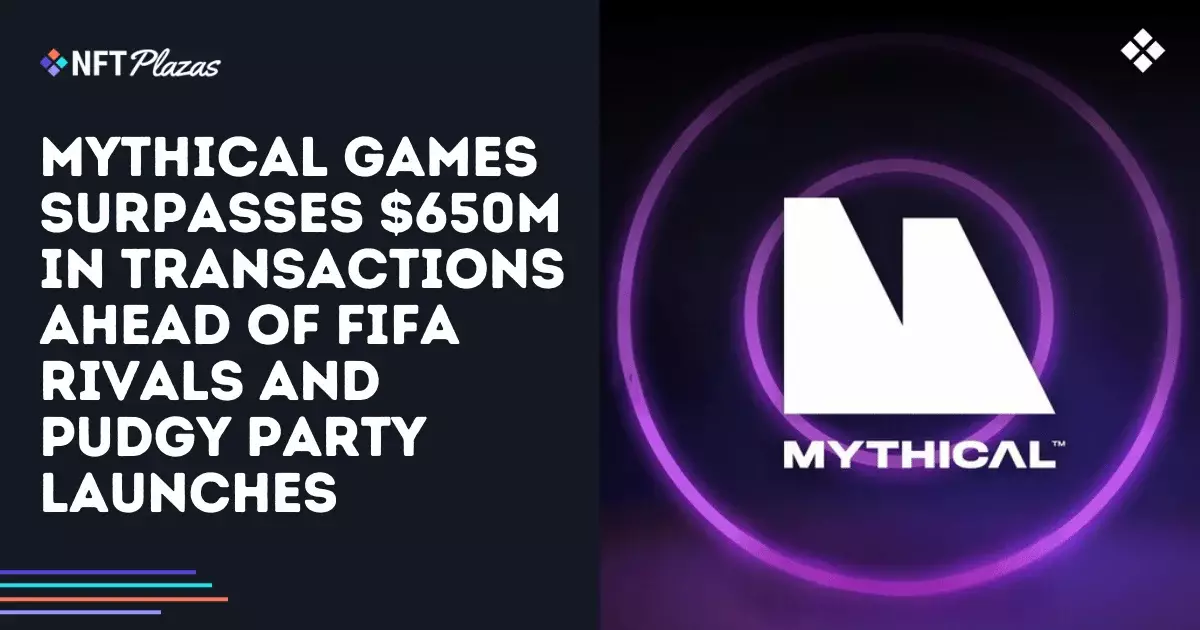Mythical Games has made waves in the gaming industry by announcing that they have surpassed an impressive $650 million in total transaction volume. With over 7 million registered players, one can’t help but wonder about the sustainability of such rapid growth, especially in a space as volatile as NFT gaming. The company is gearing up for the release of two new mobile games, FIFA Rivals and Pudgy Party, in 2025. However, as the gaming landscape becomes increasingly saturated with blockchain-driven innovations, one cannot ignore the ethical implications and potential pitfalls that come with this technological embrace.
The Gaming Landscape: Blockchain or Bust?
Founded in 2018 by former Activision stalwarts, Mythical Games presents itself as a pioneer in marrying traditional game development with blockchain technology. Their existing titles, such as Blankos Block Party, NFL Rivals, and Nitro Nation World Tour, reveal the intention to keep players engaged in familiar formats while subtly integrating the complexities of NFTs and cryptocurrency. The question arises: is this really innovation, or a desperate attempt to dress up old concepts for the new-age gamer?
One might argue that Mythical’s strategy of embedding blockchain features within traditional gameplay is a clever marketing gimmick. Rather than promoting crypto as a distinct element, they choose to blend it into a seamless experience. While this may be attractive at first glance, it raises concerns regarding transparency and the potential to manipulate user perceptions. Gamers, often seeking escapism from real-world financial complexities, may find themselves unwittingly trapped in a system that commodifies their engagements.
The Flawed Premise of Ownership
Possessing digital assets through blockchain has been heralded as one of the main advantages of NFT gaming. However, true ownership remains an intangible concept, especially when the platform or game can revoke access at their discretion. Mythical Games claims to provide the infrastructure that allows game developers to offer asset ownership, yet players should critically examine what exactly they own. If the game environment can change overnight, how secure are those assets really? Investors might view these NFT transactions as mere revenue streams rather than something of permanent value.
Mythical’s use of the $MYTH token for in-game purchases and governance raises another point of concern. While an engaged community around a cryptocurrency can allow for more enriching gaming experiences, this might also develop into a socio-economic hierarchy among players. Those willing to spend more will have better access to premium content and benefits—creating an exclusive bubble rather than an inclusive gaming landscape. Such disparity runs counter to the very principles of gaming, which should encourage equality and shared experiences.
The Marketing Machine: A Catalyst for Ethical Dilemmas
Amid the hype surrounding Mythical Games, one cannot overlook the juggernaut of marketing behind their success. Backed by prominent investors like Andreessen Horowitz and Animoca Brands, it’s clear that significant financial interests align with the proliferation of NFT-driven gaming. As FIFA Rivals and Pudgy Party approach their respective launches, it appears that corporate financing and strategic partnerships may overshadow the best interests of the gaming community.
Mythical’s planned rollout signifies an attempt to extend their grasp in the mobile gaming space, but at what cost? Arriving with established IPs like FIFA only amplifies the ethical quandaries surrounding the commercialization of beloved experiences. How much of the gaming experience is dictated by apparent financial motives? This introduces the question of accountability: are developers prioritizing player satisfaction over profit? As noted in contemporary gaming discussions, the interests of players must be prioritized to cultivate long-lasting engagement and trust.
A Cautious Consideration for Gamers
For gamers, the influx of blockchain technology in gaming can be both a blessing and a curse. While the possibilities that NFTs offer seem enticing, lurking in the shadows are risks that, if not carefully navigated, could lead to disappointment for players. With so many players caught up in the rush of digital ownership, one must remain vigilant. A more skeptical approach toward the allure of NFT gaming may safeguard the core essence of what makes games compelling: creativity, community, and enjoyment.















Leave a Reply